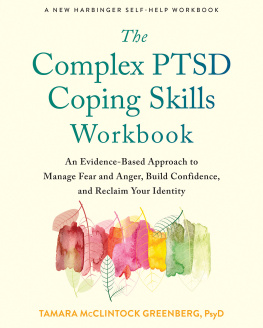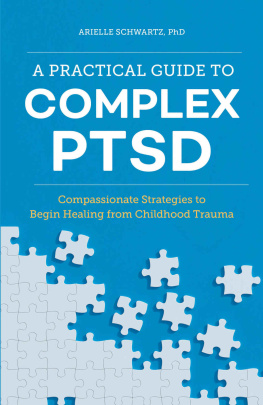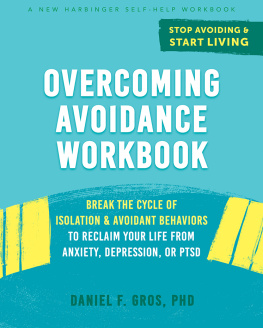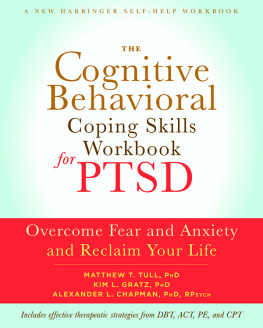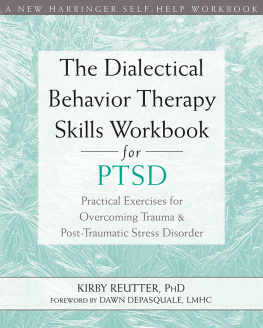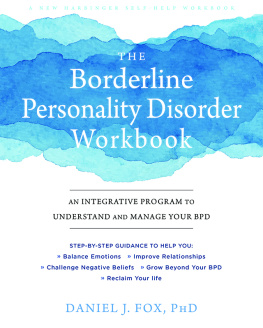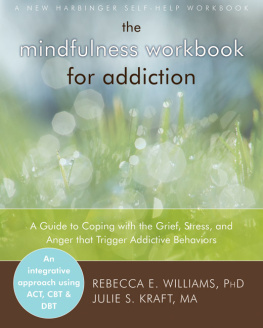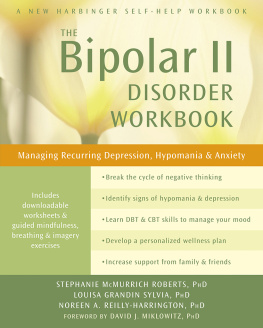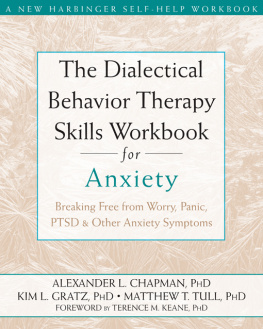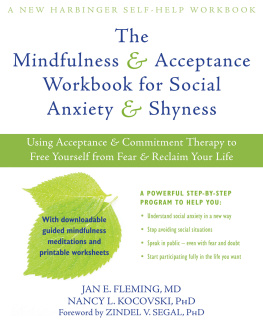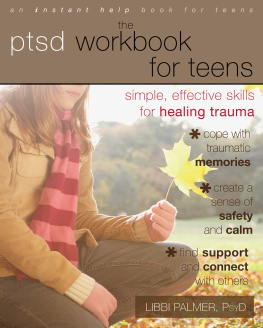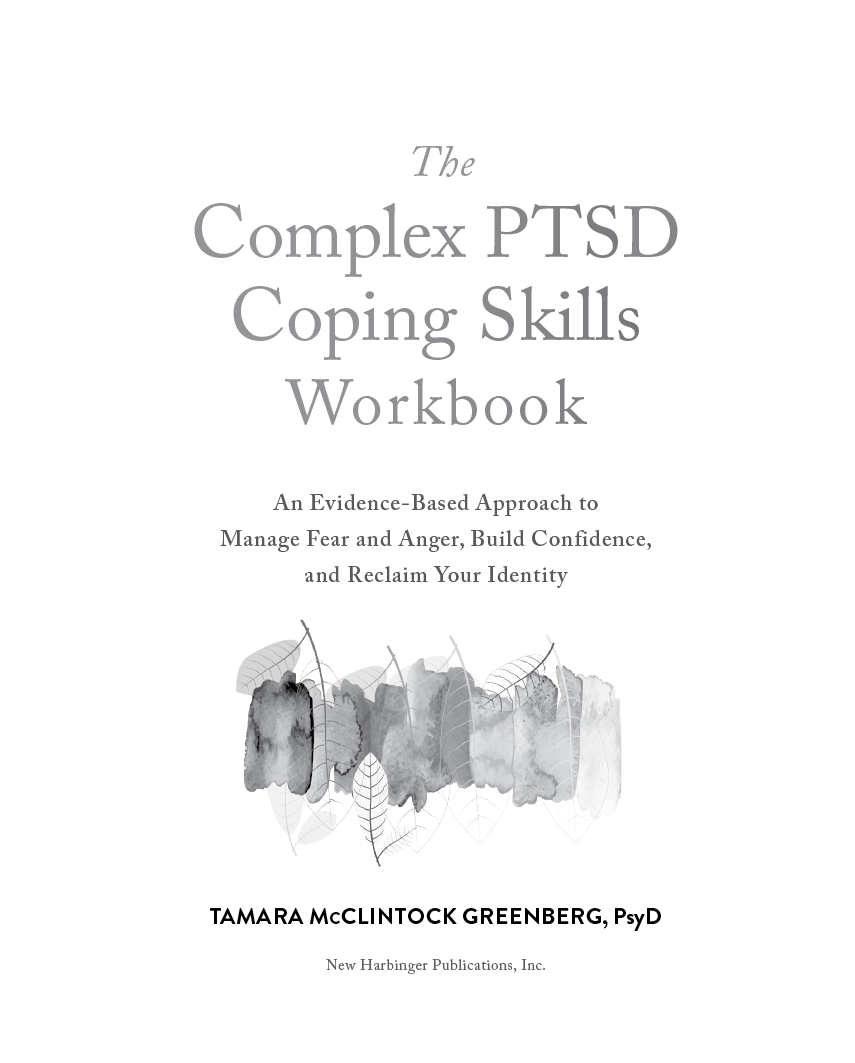Tamara McClintock Greenbergs workbook engages readers in a conversation that brings into focus the real-life dilemmas posed by complex post-traumatic stress disorder (C-PTSD), and provides very practical and nuanced ways to harness the power of four Asacceptance, awareness, authenticity, and action. A truly valuable resource for people recovering from C-PTSD and their therapists.
Julian D. Ford, PhD, ABPP , past president of the International Society for Traumatic Stress Studies, and professor at the University of Connecticut Health Center
Quite simply the best workbook for clients dealing with trauma. Its both incredibly insightful as well as accessible, with an astute sense of what clients who have lost their identities because of adult and childhood adversity need. This book provides nurturing and healing advice that will benefit all trauma survivors. Greenbergs deep empathy and compassion is on every page. It also serves as a vital resource for clinicians working with clients who have C-PTSD. In time, this will be a staple of every clinicians library.
Dan Hocoy, PhD , president of Goddard College, licensed clinical psychologist, and coeditor of APA Handbook of Humanistic and Existential Psychology
The Complex PTSD Coping Skills Workbook is a wonderful resource for anyone who has ongoing distress as a result of multiple negative or traumatic events. Incorporating clinical experience, research findings, and a deep, compassionate understanding of the issues, Greenberg has created a practical, supportive workbook that can be used alone or with a therapist to find a path to feeling and being more in control of your life.
Elizabeth McMahon, PhD , psychologist, and author of Overcoming Anxiety and Panic Interactive Guide and Virtual Reality Therapy for Anxiety
An informative, engaging, and highly practical workbook. Greenberg provides the reader with a range of clearly articulated strategies for dealing with the aftermath of complex trauma: from noticing and accepting anger, to managing dissociation, to finding a therapist. The guidance is excellent: firmly rooted in theory, evidence, and the latest clinical wisdom. I highly recommend this book.
Mick Cooper , professor of counseling psychology at the University of Roehampton, London; and coauthor of Personalizing Psychotherapy
The Complex PTSD Coping Skills Workbook provides an extraordinarily powerful road map for treating complex trauma. Tamara Greenbergs respectful and inviting tone is sure to make this a classic workbook. All C-PTSD patients, families, and therapists need to get this book.
Louann Brizendine, MD , neuropsychiatrist, and New York Times bestselling author of The Female Brain and The Upgrade
In this workbook, Tamara Greenberg once again gifts us with her masterful blend of theory (defining C-PTSD), clarity of understanding underlying multiple issues such as dissociation and substance abuse, practical lessons for managing difficult emotions and relationships, and finding the right therapistand finally always with her wise and compassionate voice.
Ilene A. Serlin, PhD, BC-DMT , coeditor of Integrated Care for the Traumatized
Trustfully inviting, this workbook is both intensely personal while universal in its helpful information and deep wisdom. As a physician witnessing womens lives for over forty years, this single volume unlocks areas of confusion and frustration that increasingly have separated people from more joyful living. Greenberg shares stories from her many years as a therapist and guides the reader through an efficient, productive, and self-affirming healing journey.
Ricki Pollycove, MD, MS, FACOG, FNCBC , fellow of the American Congress of Obstetrics and Gynecology, author of The Pocket Idiots Guide to Bioidentical Hormones , and coauthor of Mother Nurture
This has been such a wonderful read. This workbook is perfectly timed, and not only defines C-PTSD but reflects on its pernicious effects. Tamara really breaks down the impact of C-PTSD and provides practical tools for navigating through its challenges. This book is a wonderful resource for individuals interested in healing and understanding how to support others suffering from C-PTSD.
Ankhesenamun Ball, PsyD , clinical neuropsychologist; and clinical director of Being, A Psychological Corporation
A marvelous workbook! Tamara McClintock Greenberg writes a wonderfully accessible and practical guide for anyone who has experienced trauma, and in particular, for those who are living with C-PTSD. The stories, vignettes, explanations, checklists, and reflective exercises provide an exquisitely constructed, down-to-earth road map for promoting change. This resource destigmatizes C-PTSD and brilliantly leads the reader to take the fear out of facing trauma.
Erick Hung, MD , professor of clinical psychiatry at the University of California, San Francisco
Publishers Note
This publication is designed to provide accurate and authoritative information in regard to the subject matter covered. It is sold with the understanding that the publisher is not engaged in rendering psychological, financial, legal, or other professional services. If expert assistance or counseling is needed, the services of a competent professional should be sought.
NEW HARBINGER PUBLICATIONS is a registered trademark of New Harbinger Publications, Inc.
New Harbinger Publications is an employee-owned company.
Figure 2.1, depicting the HPA Axis, also appeared in Treating Complex Trauma by Tamara McClintock Greenberg, copyright 2020 Tamara McClintock Greenberg/Springer Nature.
The CooperNorcross Inventory of Preferences (CNIP) is copyright 2015 by Mick Cooper and John Norcross. Used with permission.
Copyright 2022 by Tamara McClintock Greenberg
New Harbinger Publications, Inc.
5674 Shattuck Avenue
Oakland, CA 94609
www.newharbinger.com
All Rights Reserved
Cover design by Amy Daniel
Acquired by Jess OBrien
Library of Congress Cataloging-in-Publication Data on file
Contents
Introduction
If youve picked up this book, Ill guess youve experienced some difficult things in your lifeand that you are also incredibly resilient. This is common in trauma survivors (and one reason we as a culture often focus on the concept of surviving, not victimhood).
Complex post-traumatic stress disorder, or CPTSD, occurs when you have experienced whats known as complex trauma. This is trauma thats caused not by one discrete traumatic event but by multiple events, usually beginning in childhood, that have profound impacts on your self-concept and your ways of relating to others. CPTSD happens based on the aggregate of trauma; it represents what is often a life filled with difficulties. As such, the symptoms of CPTSD can be more severe, long-lasting and woven into your personality, which is different than what happens with post-traumatic stress disorder (PTSD).
As youll hear me describe, CPTSD has a profound impact on identity. Early and repeated traumas take away important aspects of our sense of self; ultimately they result in a kind of identity theft. They can cause us to be unclear about our true thoughts and feelings and can make us unsure of the kinds of people we want or need to be around. It makes it hard to know how to be assertive; it makes it hard to know how we can take care of ourselves. Who you really are can be confusing, especially if your history is murky and unclear, with limited or disjointed narratives. And when youre in this situation, anger, fear, and uncertainty can become a powerful presence in your life and in ways that are often unwelcome.

